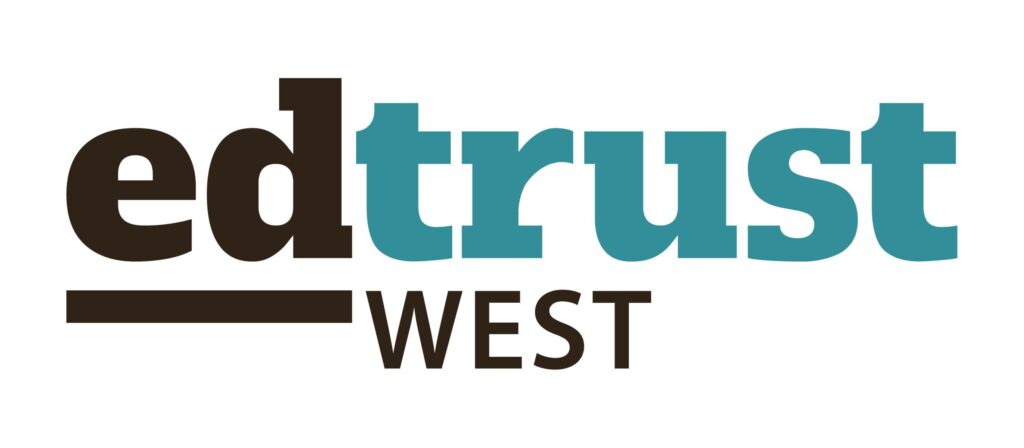Leading education group finds reasons for optimism and calls for greater accountability
OAKLAND, CA (September 13, 2010) Two new reports from The EdTrust—West, a statewide education advocacy organization, demonstrate the disturbing impact of California’s failure to close opportunity and achievement gaps plaguing African-American and Latino children who together now make up almost 60 percent of the state’s student population. In Opportunity Lost: The Story of African-American Achievement in California, 2010, and Futures At Risk: The Story of Latino Student Achievement in California, 2010, the group reveals a number of local school districts successfully dispelling the myth that African-American and Latino students cannot perform at grade-level or make great gains toward proficiency. The reports call on California policymakers to no longer be satisfied with convening task forces that highlight problems everyone knows exist, and recommend that state leaders instead focus on finally implementing high-impact solutions that have long been avoided or ignored.
“As a state, there is still a long way to go as we strive to offer African-American and Latino students high quality educational opportunities that could eliminate pervasive achievement gaps,” said State Senator Curren D. Price, Jr. (D-Los Angeles), Vice Chair of the California Legislative Black Caucus. “It is time for us to commit to providing every child in California with the great schools they deserve. Our state’s future is dependent on it.”
Achievement and opportunity gaps begin in elementary school and continue through high school and into college for African Americans and Latinos. For students who will be California’s future workforce, advancing to the next grade does not necessarily mean advancing in achievement. Student achievement declines and opportunity gaps persist from one grade to the next. As a result, African Americans and Latinos graduate from high school at a lower rate than their white classmates. Even when they do make it to graduation, they are too often unprepared for postsecondary education and career opportunities. Of those who make it to college, significant numbers do not obtain a degree.
“It is extremely important that California address the specific needs of Latino and African American youth. Education reform efforts must address the crisis presented in these reports,” said Assemblymember Tony Mendoza (D-Norwalk), Vice Chair of the California Latino Legislative Caucus. “We are at a critical point. If we do not make a shared pledge to close opportunity and achievement gaps for Latino and African American students, we are putting California’s future at risk.”
While there is much to be concerned about, there is also reason for optimism. Some districts are making headway in boosting African-American and Latino student achievement. The reports identify top performers for gains in CST scores among African-American and Latino students in California’s largest unified school districts. Conversely, the reports indicate which districts have more work to do in their efforts to improve student performance.
“Data from higher performing districts reveals inequitable access to a better quality education in our state. It’s time for us to learn from and celebrate those making the greatest gains and to finally hold those who are persistently underperforming accountable,” said Dr. Arun Ramanathan, executive director of the EdTrust—West. “We must also stop pointing the finger of blame at communities of color for our education system’s failures and instead leverage the strengths of our diverse students and fulfill the hopes and aspirations of their parents.”
The trends in the two reports are confirmed by 2010 Accountability Progress Report (APR) data released today by the California Department of Education. Though the data show academic gains and a narrowing of the achievement gap by California districts overall, vast disparities in achievement persist for the state’s African-American and Latino students.
For example:
- Although African-American students collectively increased their API scores by 15 points, from 670 to 685, they continue to trail their white peers by an alarming 153 points. Their score of 685 is well below the state target of 800.
- While Latino students statewide posted a 17-point increase moving their API score to 715, the gap between Latino and white students is 123 points.
Looking at how individual districts performed reveals glimmers of hope for students of color:
- At Manteca Unified in San Joaquin County, Latino student performance has steadily improved over the last eight years. This year, Manteca posted a dramatic increase of 72 points in Latino API.
- Garden Grove Unified in Orange County saw significant gains among their African-American students, improving 42 points to an overall API of 786.
- API scores for African-American and Latino students in Compton Unified in Los Angeles County increased by 43 and 37 points, respectively, in 2009-10. These admirable gains provide encouragement for the important work that remains as the district continues to address overall API for African-American (655) and Latino (686) students.
- Oakland Unified in Alameda County posted gains for its African-American and Latino students of 20 and 32 points, respectively, well above the state average gains for these subgroups. Again, such gains provide encouragement as the district works to improve overall API for Latino (692) and African-American (645) students.
“While the gains posted today continue to move the state in the right direction, we recognize that the gaps that separate thousands of our minority and low-income students from their peers are unacceptable,” said State Superintendent of Public Instruction Jack O’Connell. “We know that we cannot rest until the achievement gap is completely eliminated and all of California’s students are well-prepared for college, work, and life.”
For more details, both reports are available online.
###
About The EdTrust—West
The EdTrust—West works for the high academic achievement of all students at all levels, kindergarten through college, and to forever close the achievement gaps separating low-income students and students of color from other youth. Our basic tenet is this— All children will learn at high levels when they are taught to high levels.

